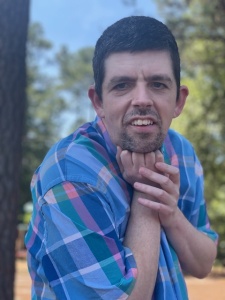| Lea and Eva
My husband is Juan Carlos, is 35 years old. I am |
Arquivo da Categoria: Notícia & Anúncios
Kristin B.
Kristin B. |
Kristin, é difícil acreditar que já catorze anos desde que você nasceu. Texas did not screen for propionic acidemia in 1999, e descobrimos que a maneira mais difícil quando você tinha cinco meses de idade. Sua primeira crise metabólica desembarcou nossa família na sala de emergência, no terceiro aniversário do seu irmão, mas naquela época os médicos só achei que você tinha um vírus. Após três dias de fluidos IV e glucose eles nos mandaram para casa. Nós ainda não sabia que você tinha PA naquele momento e continuou a alimentar você alta proteína Similac. Durante a próxima semana você começou a ir ladeira abaixo novamente com a falta de emoção, olhando para o espaço, e continuada vómitos. Com o tempo você estavam rolando a cabeça para trás e para a frente o seu pediatra chamou e nos disse que tinha PA. Felizmente o médico ER quem você examinou ordenou testes de ácidos orgânicos 10 dias antes ou que ainda não teria sabido o que estava acontecendo com você. Eu acho que começou a mais difícil jornada que seu pai e eu poderia ter imaginado.Quando você trouxe para casa do hospital que estava flácido, emoção e não tinha força superior do corpo. Você tinha perdido a sua capacidade de levantar os braços, sua cabeça estava instável como um recém-nascido, e tombou na cintura. Sua pele estava muito pálido, ea conexão mental que eu tinha formado com que você se foi. Eu não sabia quem você era mais. Eu tinha perdido a minha filha, e eu não sei se você nunca iria voltar. Isso é uma coisa difícil de olhar, dia após dia. Mas ao longo do tempo, com muita paciência, terapias e tocar normalmente, de ter crescido em uma muito bonita jovem que pode fazer um monte de coisas que inicialmente pensou que nunca poderia fazer. Embora você não anda, você rastejar ou do joelho-pé em toda a casa, brincar com quebra-cabeças, brinquedos e instrumentos musicais, seu mini computador e dispositivo de comunicação, E você ama canções com alguém cantando. Você já confiscou a maioria dos brinquedos velhos do seu irmão, e seus jogos mais divertidos estes dias são o zoom caminhões ou carros Hot Wheels pelo chão com alguém, ou balançando o Star Wars sabre de luz em torno! Seus programas favoritos continuam a ser Clifford, Ursinho, Tales Zoboomafoo e Veggie. Você gosta de ir para fora, ir para passeios no van e jogar no piano. O seu concerto favorito DVD é U2 com Bono cantando Beautiful Day. Você vai ficar de joelhos na frente da tela com um grande sorriso em seu rosto e, em seguida, puxar sua camisa sobre sua cabeça e cantar quando Bono entra em cena. Meu Deus, se você fosse “normal” Eu poderia ter uma criança selvagem em minhas mãos com você se transformando em um adolescente!Ao longo dos anos sua dieta PA e remédios mudaram um pouco. Você não está mais na DDAVP hormona anti-diuretc porque descobrimos, novamente da maneira mais difícil, que você não tem diabetes insípido. Isso foi um diagnóstico errado em idade 4 e de alguma forma por seis anos, você conseguiu fazer bem em uma droga que poderia tê-lo matado. At age 10 você começou a ter convulsões e todos estavam intrigados. Você nunca teve convulsões no passado. Finalmente, percebemos que você não tem o suficiente de sódio em sua dieta e depois de alguns testes, foi determinado seus rins funcionou bem e você não precisa de DDAVP. Você realmente chocado os médicos com aquele. Um médico disse que você é um enigma envolto em um mistério dentro de uma caixa de quebra-cabeça! Você ainda tomar uma série de suplementos nutricionais que são projetados para ajudar a aliviar o estresse oxidativo ou aumentar a produção de energia. Elas incluem vitaminas do complexo B, dose elevada de biotina, co Q10, vitamina E, succinato de sódio e L-carnitina. Nós também dar-lhe vitamina D3 e cálcio extra.Seu uma vez dieta g-tubo feito sob medida que, durante anos incluídos legumes Gerber, frutas e cereais foi substituída um par de anos atrás, com uma fórmula mistura sintética de Propimex-2, Prosobee e Polycose. Esta dieta era para simplificar as coisas , mas em vez disso, tem complicado os seus cuidados. Além de ganhar mais peso precisava-un, sua nova dieta tem feito a sua pele olhar mais pálida a menos que consigamos levá-lo fora no sol muito. Você era mais estável em sua dieta de idade, que continha um carboidrato complexo (aveia) que a nova dieta que contém Polycose ou Sol Carb. Tenho certeza que sua glicose foi mantido a um nível ainda mais com farinha de aveia do que um açúcar simples que faz com que a glicose a espiga cada 2 horas quando você está bolus alimentados durante o dia. O principal problema é que para mantê-lo estável e cetona livre que tivemos para adicionar mais calorias do que gostaríamos e de ter obtido bastante pesado. Você sempre ganhou peso com facilidade, mas esta dieta sintética causou-lhe ganhar mais. Outro problema que se desenvolveu mais à medida que estou ficando mais velha é que qualquer aumento da proteína requer um aumento em calorias ou você está doente. É meio irônico que na idade 14 Entendemos que você muito melhor, mas que é preciso mais mexer com a sua dieta para mantê-lo estável. Talvez este é um companheiro da puberdade?Bem, Kristin, você é agora um adolescente, e estamos nos movendo para uma outra caixa preta, um desconhecido reais. Eu espero que você continuar a ficar estável e feliz uma vez que os hormônios realmente começar a andar de bicicleta. E eu espero que você ajusta bem ao seu irmão se movendo para a faculdade em um ano ou assim. Você ama o seu irmão tanto! Quais são seu pai e eu deveria fazer quando Eric não está aqui para dizer “nite-nite Kristin!” como seu sinal de saída para ir para a cama? Você já precisa Benadryl e melatonina para dormir bem. Poderíamos ter que fazer Face Time! abóbora doces sonhos, nós te amamos.No one can be prepared for the arrival of a special needs child. When you came
|
Nehori
|
Nehori
Two mounth ago he was at E.R in ittenssive care and almost lost his life cause an unstopable vomiting that caused him obfuscation his contionce , only after helfh a litter blood, he came to his senses. Today, we are considering a liver transplant on nehori, we are not sure cause we havent heard of any child that went a liver transplant yet. Atualizar: May 2012 Neoray had a liver transplant on November 2011 with the recommendation of |
Allison S.
Trent M.
| Trent M. |
|
After arriving at Kosair Children’s hospital in Louisville, KY – he was immediately put on Phenobarbital, and had an EEG, MRI, & CT scan. Ele tinha sete apreensões total que dia. Que no dia seguinte, we met an angel right here on earth. Our neurologist, Dr.. Vinay Puri. Without this man, nosso pequeno Trent teria não estar vivo hoje. Depois de alguns dias de trabalho de sangue constante, numerous tests and a muscle biopsy, Dr.. Puri told us that he believed Trent had Leigh’s Disease. The life expectancy of Leigh’s disease is 5 to 6 years. Of course, our families were devastated. We were in the hospital for eight days on our first stay, so were ready to go home and enjoy what time that we had left with Trent. We went home from the hospital with instructions to take 7 or 8 over the counter vitamins/medicines. On our first night at home, Dr.. Puri called and proclaimed the good news that Trent didn’t have Leigh’s but he had PA. Knowing only that PA had to do with protein, we thought “Oh wow, we will have to buy everyone a cookbook so that we make Trent friendly dishes.” Little did we know, que a PA teria um impacto muito mais do que a nossa cozinha. O primeiro mês de conhecê-lo oficialmente foi PA era áspera, going for blood work every few days to check Trent’s levels. Dr.. Puri, who had never heard of PA before now, was communicating with Dr. George Hoganson for guidance on how to treat it. We were put on Carnitine, biotina & Propimex 1. We could see Trent staying awake for longer amounts of time so we knew that we were on the right track. The feedings were still a battle though after a 4 oz bottle feeding, we would hold him in our arms for an hour or more to avoid the refluxing or projectile vomiting. This went on for a few months and then in July we ended up back in the hospital because we couldn’t get him to eat. He was becoming life less again. By this time, we had been introduced to OAA. While at our July hospital stay, we urged for a g-tube & Nissan. Dr.. Puri agreed that it was the right thing to do. We were in the hospital for 18 days (and we thought 8 was a lot before!). Going home with the G-tube, we were finally able to meet the real Trent. It was like a miracle. Being able to get all of his needed calories into his system, he immediately become alive. We have a photo album and it makes you so sad just to look at the photos taken of him before the g-tube was placed. The g-tube was definitely the best choice for us. There had been so many days in his first few month of life, where he didn’t even have the energy to cry even during a blood draw. So these days, his just hearing him cry was music to our ears. With PA in our life, daycare was out of the question so my husband decided to work on a second shift schedule with his hours being from 3 – 11 pm. After a few more months, I finally went back to work and my hours are from 9 – 5 pm. Since our work hours overlap, Trent’s grandmother picks Trent up each day. She will stop & pick up Trent around 2:30 em the afternoon and takes him to her house until I am off work. Our lives were getting some routine to them, not a typical family routine – but it’s ours. We had adjusted our schedules and outings to accommodate his every 3 hour tube feedings. Trent did really well for about a 4 month stretch, only requiring one quick 2 day stay in the hospital for fluids until Nov 2002. In Nov, he and I came down with a nasty stomach virus. This resulted in another 18 day hospital stay for us. Thanksgiving was nearing and we desperately wanted to be at home for the holidays. But Trent could not get rid of the diarrhea. While feeling desperate for some helpful medical advice, we got in touch with Julie Hardin in Lexington, Kentucky. She put us in touch with Dr. Rani Singh at Emory Genetics. Thru the advice of Julie & Dr.. Singh, his diarrhea was finally stopped and we were released from the hospital the day before Thanksgiving. Since then, Dr.. Singh follows Trent. She is another angel right here on Earth. She has helped us weather that same stomach virus since at home without a hospital stay. As the 2003 year went by, things were getting progressively better for Trent. His early intervention was in full swing with PT, OT, Nutrition Services, & Speech. Our therapists proved to be awesome. At around 10 months old he sat up alone. begin crawling at around 14 months & andando na 19 months. The speech & eating parts were (and still are) by far the hardest. Trent said his first word, “MA MA” at around 23 mês de idade. Batendo na madeira, the Nov 2002 has been our last hospital stay. Trent is 4 years old now & still delayed in every aspect but he is making progress daily. I would compare him to a 2 ½ year old child. He is doing much better with OT & PT. His attention span is still very short and he typically wants to play things “his own way”. His speech has really picked up lately too, although some of it is still hard to understand. His vocabulary probably consists of about 50 – 75 words and lately he is really into repeating what he hears. He will sometimes put a 2 to 3 palavra frase juntos. Ele tem a terapia de alimentação privada a cada duas semanas. At this time, he gets nothing by mouth and will only drink when forced. Currently his feedings are every 3 horas com três onças de suco de dados entre cada alimentação com fórmula. At night, he is hooked up to an overnight pump. Having a tube feeding every hour & a half can be a little time consuming but since Trent has done so well with it, we prefer to just let it be. Outings are normally planned around the feeding schedules & the weather. We aren’t giving up hope that one day when eating becomes a social issue then he will want to take part and eat by mouth. He did attend preschool two days a week last year. He had terrible attendance (he was only there for 15 days) because he was always carrying home the latest germ. His 2nd year of preschool will be starting very soon. It is so hard to “let go” & send him to school – but we know that he needs the socialization side of school. His grandmother works at the same school, so it is comforting knowing that she is always nearby. Trent loves typical kid things – singing, coloring, playing in rocks, feeding the fish at his Papa’s & Nana’s house, & riding the four wheeler with his Pap. He is such a joy to be around. He has such a happy spirit about him (that is until you pull into his doctor’s office). We hope & pray that the next few years find us having a healthy Trent who is continuing to talk up a storm & eat some by mouth. We know that God sent us a special child for a reason & even though PA causes our family stress on a daily basis, we know that God blessed us when he chose us to be the ones to take care of such a sweet little boy. Sincerely, The McKinley’s To see more pictures of Trent, check out the August 2006 boletim informativo. |
Aidan P.
|
Aidan P Miracles Still Happen – The Miracle Continues Aidan, born on March 23, 1994 Birth of an angel Milagres ainda acontecem e meu filho Aidan, is a living miracle by me. Aidan turned 13 this year. He is a happy, cheerful, handsome boy who was diagnosed with Propionic Acidemia when he was 3 weeks old. Aidan had a difficult birth that was further complicated with a Steph infection when he was delivered. After spending in IICU during the first two weeks, he was released to us and everything seemed normal at that time. A few days later, we noticed that he seemed lethargic and inattentive with no inclination to feed. Repeated consultation with his pediatrician went no where and we were getting increasingly concerned that Aidan was fast approaching a comatose state. An unexpected call from the University of Pittsburgh that had screened Aidan’s blood for PKU revealed very high content and we were asked to rush Aidan immediately to the Children’s Hospital in Philadelphia. Aidan was seen immediately by a team of experts led by Dr. Paige Kaplan and admitted into the IICU (again) and placed on IV. It was found that he had very high levels of ammonia in his system. After several blood /platelet transfusions and a stay in the IICU for three weeks, Aidan was declared out of immediate danger and moved to the general pediatric ward. He was held in the hospital for a few more weeks before being allowed to go home. During his first year of life, Aidan was repeatedly hospitalized several times and each time it was a traumatic experience for all of us. He had spent over seven months in the hospital during the first twelve months of his life. The second year was slightly better with hospital stays that lasted days instead of months. Tough beginnings During the first few years the going was tough on all of us. It was extremely difficult for Aidan as we observed several global delays in him and he was late in hitting every developmental milestone. He did not walk until he was three years old and was not verbal until he was six years old. Aidan had a regiment of therapies as he was growing up and even though the therapies have dwindled over the years, he still continues to receive therapy on a regular basis. To put our ordeal into perspective, I have to give a little background on our life before Aidan. My husband Ravi migrated to the US from India for his graduate studies and I followed him here after our marriage. Aidan was born exactly a year after I came to the US. The culture shock, the extreme cold weather and the loneliness of leaving my family and loved ones behind, just added to the complexity of the situation. Our life together was an emotional roller coaster and we had no family or real friends who could offer support at these difficult times. We could not partake in social gatherings since we always ended up leaving early due to Aidan’s needs and as time went by, people started leaving us alone since they did not have the emotional maturity to understand our situation and offer support or they did not want to be bothered. We had no one to turn to except each other and this brought us closer to each other since we were committed to giving our son the best life possible and I found the purpose of my life revealed. For me, Aidan was never just a child, he is an angel sent from heaven on a mission. I am not saying this because I am his mother, but because everyone who comes in contact with him says the same. There have been strangers who have walked up to me and said your child’s face is angelic. His cheerful childish ways and endurance to pain in the worst of situations and his pure love for people is a miracle by its own. Better times Aidan was 3 years old when we moved to San Jose California. After a year of difficulty finding a good team of doctors, we became members of Kaiser Permanente. He was back again with an excellent team of doctors and nutritionist. His nutritionist Elaina Jurecki however has been the lead in shaping Aidan into what he is today. Her insights, knowledge and expertise has been a godsend to us. We also became very active in a South Asian organization called Jeena. This organization is a support organization for special need kids. The organization consisted of families with kids like us who were also looking for a social network and who had faced the same level of ostracization from their social peers and who were yearning to connect and share with others in a similar situation. The challenges that we faced as a family in the social front, led me to play an active part in establishing this organization along with its founder. Having a special need child and coming from a different country/culture provided many challenges. And having no family in the country made it essential to develop a network of dependable friends who could empathize and offer both emotional and physical support at the time of need. In this process we have met many good people and made many good friends. We had found our bearings and with the passing of years we have formed stable friendships that could last a lifetime. Aidan has been attending a special education school in San Jose. He was with the same Elementary school teacher/classroom for almost 5 years. He grew very attached to his teacher and it was also very difficult for his teacher to let him go. When he graduated from the elementary school she sent him off to middle school with a brand new Mac computer, a collection of software that can last a lifetime and books on several subjects that would serve a whole classroom full of kids. He is settling down slowly in his new school and adjusting to his new teacher. His new friends have taken to him well and are very fond of him. Besides school, he goes to Score Computer Based learning center. He is very computer savvy and knows his way around with PC games and software. He loves web surfing and his current favorite is Youtube where he watches his favorite TV theme songs such as Barney, Teletubbies, Scooby-Doo, Jeopardy, Wheel Of Fortune over and over again. He also goes swimming and attends gym classes in Jeena. Aidan has a younger brother Brenden who is 9 years old and who adores him. Aidan loves having his brother around. The beginning challenges we had in devoting equal amount of attention to both kids got easier as years went by. We have now learnt to balance our time and life between the two kids and also our careers. We also have a great nanny who helps us in taking care of the kids. We are able to travel places and do things that normal children do, like visiting theme parks, going to shows, going for bike rides etc. Aidan is finally able to ride a bike after so many years. This is a specially made bike with three wheels and pedals designed for children with physical difficulties. He wears braces to provide ankle support and uses a wheel chair when we go on long walks or have to travel to unknown places. He is very interested in music and dancing. He especially enjoys Indian music. He has an incredible sense of rhythm and it amazes me when I see him move to the beat even if he cannot use his legs very well. I often catch him dancing to music in front of the mirror. He has also participated in dances and performs in Jeena’s annual day celebrations. Successful completion of a decade He continues to be a miracle since his doctors gave us a very discouraging prognosis about his survival during the initial years of his life. So when he turned 11, I decided to publish a website for him. His website has brought in many contacts internationally and helps me keep in contact with people who have children with the same disorder in the far corners of the world, where they are not blessed with the quality treatment we get here. Working towards a cure – the Fundraiser I am a professional classical dancer and coupled with Aidan’s interest in Indian music and dance along with my husband’s and parents support, I decided to start an Indian dance school. The dance school has grown today quite a bit. Aidan completed 13 years this year and that made me believe that something needed to be done to raise awareness of this very rare disorder that even sounds alien to most pediatricians and medical professionals. Awareness is essential to raise funds and a CURE is needed to help our children. And it has to happen right now so that we can see some benefit from it during our lifetime. To keep the research going, we need funds. Being involved in a non-profit organization made me realize how hard it is to get a grant approved or to get donations coming in. So this year I decided to conduct a fundraiser for PA Foundation keeping in mind all my goals in increasing awareness and raising funds. My family supported me in this effort especially my kids and my husband. Along with the students and parents of my dance school we put together a dance performance and a fundraiser on May 12th 2007. My friends helped me by putting up a silent auction and volunteering their time and energy for the several tasks involved in making the event successful. The event was a huge success. It was attended by almost 500 people. Elaina Jurecki, Aidan’s nutritionist gave a presentation for about 20 minutes on the topic of PA and why funds were necessary to conduct research looking or a cure for this rare and devastating disorder. To many of the audience it was a revelation that such a disorder existed. There was no admission ticket charge and all the funds were raised through donations and the silent auction, was donated to the PA foundation for research. People not only donated during the event, but also several days after the event had taken place. Funds close to $3500 was raised during the event which has been sent to the PA foundation. In addition to the fundraising, there was quite a bit of media coverage on the event and its cause. But I believe that this is just the beginning. With my angel at my side, I am hoping to continue to contribute in whatever small way possible to help support this miracle and keep it alive. I have faith and belief that before long we will see the day when all our children will be CURED. Yes, the miracle still lives and will continue to thrive!! cipreste Mãe para Aidan e Brenden Aidan’s Story is featured in the Fall 2007 Boletim informativo.
|
Elise
| Elise |
My husband and I recently celebrated 15 years together which might not seem 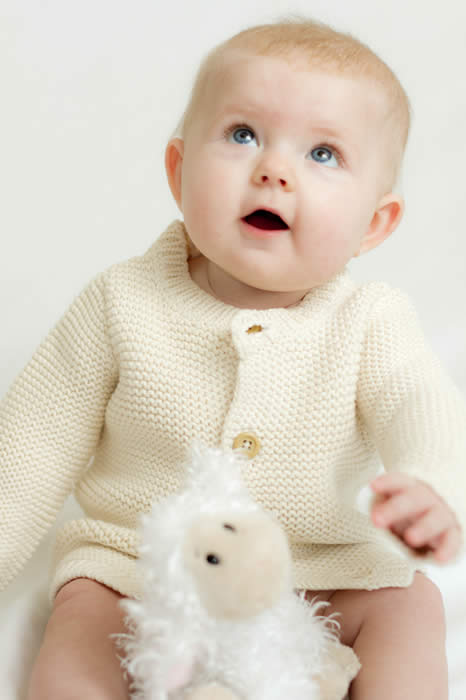 like a long time for many, but we were around 15 years old at the time we met. Our lives were in perfect order; we completed college, secured great careers, married, and bought a beautiful home to grow our family. These were all things that we planned for before we decided to finally have children. We did not know at the time but God was preparing us for many upcoming challenges. like a long time for many, but we were around 15 years old at the time we met. Our lives were in perfect order; we completed college, secured great careers, married, and bought a beautiful home to grow our family. These were all things that we planned for before we decided to finally have children. We did not know at the time but God was preparing us for many upcoming challenges.Our PA story began in October 2011 when our daughter Elise (1 week) was thought to potentially have an organic acid disorder based on her newborn screening. Elise was home from the hospital for one week all the while eating and sleeping great when her pediatrician indicated that her screening returned with elevated levels. My husband and I were not alarmed because her older brother Melbourne (18 months) had the same elevated screening when he was born and then it was deemed normal based on the repeat test. While we awaited Elise’s second set of results little Mel woke one morning not wanting to eat/drink, was moaning and running a fever. His right side arms and legs seemed to be limp. We rushed him to urgent care where they indicated that they thought he was having a stroke/seizure. Mel was transported to Children’s Hospital of WI where a number of tests, spinal tap, x-rays, and brain scans were performed on him that day. The following day we were told that they did not know what the cause was and we could go home and he would be put on anti seizure medicines. Pouco antes de nosso esperado lançamento, a equipe de genética com quem nos encontramos poucos dias antes sobre Elise entrou em nossa sala. Eles indicaram que achavam que Mel poderia ter o que achavam que Elise tinha MMA ou PA e que ele havia sofrido uma crise metabólica. After about a week in the hospital the diagnosis for Mel and Elise was confirmed; they both have PA. My husband and I had suspected something was going on with little Mel’s digestive system since he had terrible constipation and vomiting episodes since he was about 9 months old; when I stopped nursing and we put him on formula/milk. For nearly 9 months before his crisis we visited with multiple pediatricians, GI specialists, and ER visits to figure out what could be wrong. No one ever mentioned PA, and dismissed my asking if the vomiting/constipation had anything to do with his newborn screenings. We often think back to the signs and symptoms such as vomiting, gaging/choking, letargia, not thriving, staring spells, wobbling, and acid breath. Na época, essa era nossa única filha e dependíamos de especialistas para nos ajudar a descobrir o que estava acontecendo com nosso bebê. Tanto Mel quanto Elise estão se desenvolvendo bem; Mel is walking/running (getting into boy trouble) and starting to speak, he self-eats and drinks well. Since his crisis we have been following the PA diet very close with a Propimex mix and 15-16grams of protein/day. Elise is getting ready to crawl, she says “mama, dada, baba, and me” she is eating and drinking wonderfully a mix of Propimex/breast milk, and solid fruits and vegetables. Both children are taking Biotin, Carnatine, TriViSol, and Flagyl. Our goals are to continue to closely monitor the kid’s diet to take every precaution to keep them healthy. We are researching and considering PGD/IVF and cord blood banking in hopes that our future children will not be affected and can supply Mel and Elise with a potential cure from the cord blood. I have been in touch with newborn screening advocates to find out how we can share our newborn screening failure story with others and changes are made in the processes so other families do not have to face the challenges that we have. As I stated earlier God chose us to protect these babies and we will continue to fight for them. Elise was brought into our lives to save her brother; just days after her birth her brother started to lose his fight with PA and because of her help the doctors were able to save his life. We feel that our children will always have a close bond with each other and this will be quite the story to share with them when they are older and learn to protect one another time and time again. Atualizar 3/2024
It has been 12 anos desde que recebemos o diagnóstico, e ambos estão prosperando. Atribuo seu bem-estar a uma variante decente de PA, vida saudável e a vontade de Deus. Não é popular com todos, mas optamos por tratá-los de forma mais holística através de suplementos diários (Aspirar, Óleo de peixe, CoQ10, e dose para o seu fígado) Ambos tomam levocarnitina para ajudá-los a limpar e uma dose baixa de enalapril para prevenir problemas cardíacos conhecidos em pacientes com PA.. Além disso, tentamos comer de forma saudável e fazer exercícios. De certa forma, é mais fácil para eles serem mais velhos e entenderem como seus corpos se sentem quando consomem muita proteína ou se estão resfriados e precisam de açúcar extra para se sentirem melhor.. Por outro lado, é mais difícil não conseguir controlar as porções e mantê-los afastados de alguns dos seus alimentos favoritos.. Mel é adolescente e está prestes a entrar no ensino médio. Ele tem muitos amigos, aparelho ortodôntico, um celular, adora carros esportivos, política, jogos de vídeo, e é sempre o cara engraçado. Ele experimentará qualquer comida e enfrentará um desafio de comida picante. In addition, temos outros dois filhos incríveis que não têm PA. No entanto, eles têm outras condições que nos mantêm alerta: Sílvia (Fibrose cística) e Aston (Alergia ao amendoim). Nossa família nunca deixará PA definir quem somos, é apenas algo com o qual lidamos. Por agora, são crianças normais com um estilo de vida saudável e conectadas para sempre através de um milagre que as manteve juntas além das estatísticas. Se houver alguém que gostaria de saber mais sobre como nossa família administra o PA, estamos felizes em compartilhar nossas lições em defesa das crianças, vida holística, DGP FIV, Equilíbrio cerebral, ou qualquer outra coisa – vamos conectar.
Mel & Nicole |
/
Mel
| Mel |
|
My husband and I recently celebrated 15 years together which might not seem Our PA story began in October 2011 when our daughter Elise (1 week) was thought to potentially have an organic acid disorder based on her newborn screening. Elise was home from the hospital for one week all the while eating and sleeping great when her pediatrician indicated that her screening returned with elevated levels. My husband and I were not alarmed because her older brother Melbourne (18 months) had the same elevated screening when he was born and then it was deemed normal based on the repeat test. While we awaited Elise’s second set of results little Mel woke one morning not wanting to eat/drink, was moaning and running a fever. His right side arms and legs seemed to be limp. We rushed him to urgent care where they indicated that they thought he was having a stroke/seizure. Mel was transported to Children’s Hospital of WI where a number of tests, spinal tap, x-rays, and brain scans were performed on him that day. The following day we were told that they did not know what the cause was and we could go home and he would be put on anti seizure medicines. Shortly before our expected release the genetics team which we had met with just days before about Elise entered our room. They indicated that they thought Mel might have what they thought Elise has MMA or PA and he had suffered a metabolic crisis. After about a week in the hospital the diagnosis for Mel and Elise was confirmed; they both have PA. My husband and I had suspected something was going on with little Mel’s digestive system since he had terrible constipation and vomiting episodes since he was about 9 months old; when I stopped nursing and we put him on formula/milk. For nearly 9 months before his crisis we visited with multiple pediatricians, GI specialists, and ER visits to figure out what could be wrong. No one ever mentioned PA, and dismissed my asking if the vomiting/constipation had anything to do with his newborn screenings. We often think back to the signs and symptoms such as vomiting, gaging/choking, letargia, not thriving, staring spells, wobbling, and acid breath. This was at the time our only child and we depended on experts to help us figure out what was happening to our baby. Both Mel and Elise are developing well; Mel is walking/running (getting into boy trouble) and starting to speak, he self-eats and drinks well. Since his crisis we have been following the PA diet very close with a Propimex mix and 15-16grams of protein/day. Elise is getting ready to crawl, she says “mama, dada, baba, and me” she is eating and drinking wonderfully a mix of Propimex/breast milk, and solid fruits and vegetables. Both children are taking Biotin, Carnatine, TriViSol, and Flagyl. Atualizar 3/2024
It has been 12 anos desde que recebemos o diagnóstico, e ambos estão prosperando. Atribuo seu bem-estar a uma variante decente de PA, vida saudável e a vontade de Deus. Não é popular com todos, mas optamos por tratá-los de forma mais holística através de suplementos diários (Aspirar, Óleo de peixe, CoQ10, e dose para o seu fígado) Ambos tomam levocarnitina para ajudá-los a limpar e uma dose baixa de enalapril para prevenir problemas cardíacos conhecidos em pacientes com PA.. Além disso, tentamos comer de forma saudável e fazer exercícios. De certa forma, é mais fácil para eles serem mais velhos e entenderem como seus corpos se sentem quando consomem muita proteína ou se estão resfriados e precisam de açúcar extra para se sentirem melhor.. Por outro lado, é mais difícil não conseguir controlar as porções e mantê-los afastados de alguns dos seus alimentos favoritos.. Mel é adolescente e está prestes a entrar no ensino médio. Ele tem muitos amigos, aparelho ortodôntico, um celular, adora carros esportivos, política, jogos de vídeo, e é sempre o cara engraçado. Ele experimentará qualquer comida e enfrentará um desafio de comida picante. In addition, temos outros dois filhos incríveis que não têm PA. No entanto, eles têm outras condições que nos mantêm alerta: Sílvia (Fibrose cística) e Aston (Alergia ao amendoim). Nossa família nunca deixará PA definir quem somos, é apenas algo com o qual lidamos. Por agora, são crianças normais com um estilo de vida saudável e conectadas para sempre através de um milagre que as manteve juntas além das estatísticas. Se houver alguém que gostaria de saber mais sobre como nossa família administra o PA, estamos felizes em compartilhar nossas lições em defesa das crianças, vida holística, DGP FIV, Equilíbrio cerebral, ou qualquer outra coisa – vamos conectar. Mel & Nicole
|
Kaitlin B
|
|||
Reuben
| Reuben |
| Article from Spring 2013 Boletim informativo
When people ask me about my brother it’s impossible NOT to smile. He is such an amazing person! He’s friendly, strong, funny and has an infectious laugh. Reuben is completely comfortable being himself. He doesn’t judge others and has the purest soul I’ve ever met. It doesn’t bother me that he can’t drive, that sometimes I have to “translate” what he’s saying to others, or that everything in his world is related to a sport’s team- that’s “Rube”, my baby brother and my best friend.
I remember the day he was born very clearly, I was five years old and I was nervous, very anxious to meet what I thought would be a little sister. I remember being ushered into the room with my grandparents and my mama had the bow on the newborn cap covered up with her hand and then FINALLY she unveiled it and my life was forever changed- Reuben Wade Kleckley was born March 22nd, 1984. He was named after four generations of Kleckley men and I’m sure my parents had dreams of him playing professional baseball like my daddy and granddaddy did, but God had bigger plans for him.
When Reuben was two days old, he became very ill. He was having seizures and went into a coma- and the doctors really couldn’t tell my parents why this was happening or what was wrong. No one had any answers and I remember it was a very confusing time for me because what was a happy occasion quickly became a scary time for our family. Once he was moved to ICU, I wasn’t allowed to see him because no children were allowed, and that was hard because as a new big sister that’s all I wanted to do. After a few days, the nurses and my mom got together and broke the rules- dressing me in scrubs from head to toe so that I could hold him. I remember his baptism and watching him being baptized in ICU with my baptismal gown on, wires all over and a specimen cup taped to side of his head so he wouldn’t pull out his IV again- he was such a pitiful little sight. When Reuben was about a week old, he was flown to Johns Hopkins in Baltimore and was diagnosed with Propionic Acidemia, at the time there were only about 75 cases in the country so the doctors really didn’t give my parents a lot of hope. Most children didn’t live past infancy and those who did, typically had significant developmental delays. The latter proved true for Reuben.
As a child, in those first years I don’t think I really noticed that he had global delays- not walking until he was two or using phrases until he was four. It never dawned on me that he wasn’t doing things like other toddlers, I was just happy he was with us since there were so many times he almost wasn’t. I think we were more focused on his health with surgeries and trips to Duke to see specialists than any delays. I know my parents knew early on that he was going to have challenges, but it took me awhile before I noticed he was different. I remember the questions from friends and family and sometimes the stares when we would go out in public- it made me angry as a child, but it never made me angry at Reuben, it made me angry at the ignorance or other people. The only thing that bothered me about growing up with a special needs brother was that it was very isolating, I didn’t know anyone else like me and I didn’t have any friends who understood. I had no one to talk to about it. My parents would try, but I was afraid of feeling or saying anything that might hurt them or make them worry.
I think the question I get asked most often is, “Do you ever wish your brother was normal?” Sometimes people are shocked when I say “no”. I mean, what is “normal”? I think about how happy Reuben is, how much he enjoys the simple things in life and how, at 28, he is completely unaware of the negativity in this world. He’s had a lot of struggles, but he’s had so many more positive experiences! Having a sibling with special needs is not something you wish for and it’s not always easy, but Reuben has given us so much more than we could ever hope to give him. Christmas mornings are still exciting, watching him sing “Victory in Jesus” always brings tears to my eyes and it’s because of him that I’ve dedicated my professional career to working with children with special needs.
For a long time I’d heard “you’re so good with Reuben”… so, my family wasn’t surprised when I changed majors my junior year at USC, to work with children with disabilities. Once I met my first child with autism, I was officially hooked. I became an Early Interventionist after graduating in 2003 and in November, 2011, I partnered with a colleague to form Carolina Behavior & Beyond. Our company provides early intervention services to children with disabilities and developmental delays, mainly serving children from birth to age five. I love what I do and it’s truly amazing to see a child develop and transform before my very eyes. I found my purpose in life and I know without a doubt, I have Reuben to thank for that. He’s taught me that being different is not the end of the world, that there is wealth in every life if you have the heart to find it, and that you don’t have to be in the big leagues to pitch a no-hitter. Atualização sobre Ruben! Ás certo–hander foi escrito em 1992 para uma aula de redação criativa que eu estava fazendo na época Ruben será 40 em seu próximo aniversário, então provavelmente é hora de uma atualização. Ele está muito saudável desde março 2020. Reuben frequenta um programa diurno quatro dias por semana e um programa de meio período em nossa igreja, uma vez por semana. Ele adora todas as coisas de beisebol e futebol americano da NFL. Ao longo de muitos Natais e aniversários, ele acumulou quase todas as camisas e bonés do time. Sabemos que ele está chateado com alguma coisa, o que raramente acontece, quando ele joga o chapéu. Reuben joga em um time de beisebol e basquete com necessidades especiais e adora música bluegrass em todas as suas formas. Morar com Reuben é ser recebido pela manhã com “Deus te abençoe, mãe”. Sua risada pode surgir por qualquer motivo ou por nenhum motivo e é tão contagiosa quanto um resfriado comum.. Ele adora ir à igreja e a um restaurante, mesmo que ele provavelmente não coma nada, ele adora estar perto de pessoas. Reuben foi designado para o cargo de Coordenador de Felicidade em suas irmãs’ Empresa de Intervenção Precoce e é a principal razão pela qual ela escolheu trabalhar com crianças com necessidades especiais. Ele é alimentado por sonda com toda a sua nutrição, uma mistura de Duocal, Anamix e Garanta e vai petiscar batatas fritas ou Cheetos. Ele me ensinou muito sobre paciência e como aproveitar as pequenas coisas da vida e ficar satisfeito com qualquer coisa. vem em nosso caminho. Fique à vontade para entrar em contato comigo se quiser falar sobre nossos filhos. Posso ser contatado em Patt@CarolinaBehavior e Beyond.com |
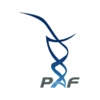
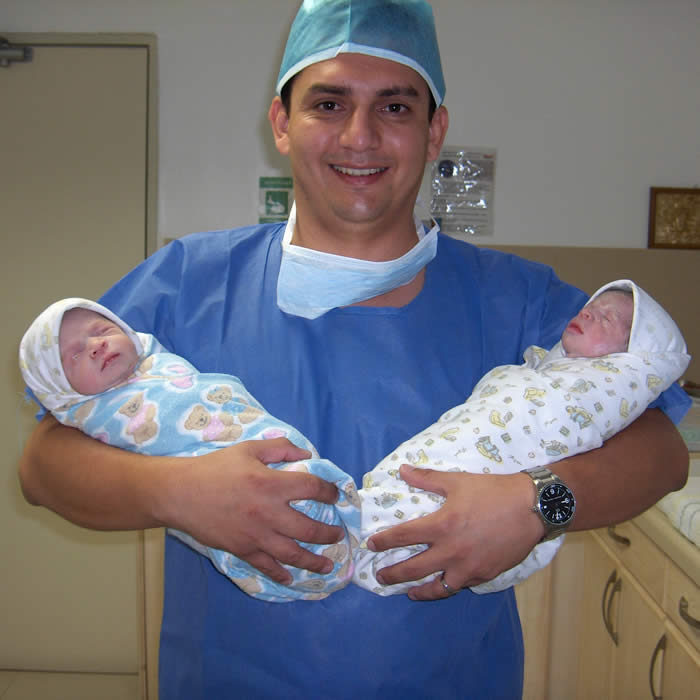 Alexandra, 29 years old. We got married on April 8, 2006 and on May 2 of the same year we found out that I was pregnant. On June 9, we were told there were two babies in different sacs and placentas. We considered the pregnancy to be normal since I did not have any kind of problems or complications. I had four ultrasounds/sonograms and everything seemed to be fine in regards to the growth and weigh of our baby girls. The C-section delivery was planned for December 20th (at 37.5 weeks) and the operation itself went fine. The first twin, Eva, weighed 4.11 pounds and measured 45 centimeters. The second twin, Lea, weighed 4.15 pounds and measured 47 centimeters. The following day after the delivery, I had the visit of the pediatrician/neonatologist, Dr.. Esaú Coreas and he said the babies were fine, but in the afternoon he told us that Lea (the second twin) had been placed in an incubator because she was not well, she had not eaten enough and seemed not to be hungry. Later on, he called us
Alexandra, 29 years old. We got married on April 8, 2006 and on May 2 of the same year we found out that I was pregnant. On June 9, we were told there were two babies in different sacs and placentas. We considered the pregnancy to be normal since I did not have any kind of problems or complications. I had four ultrasounds/sonograms and everything seemed to be fine in regards to the growth and weigh of our baby girls. The C-section delivery was planned for December 20th (at 37.5 weeks) and the operation itself went fine. The first twin, Eva, weighed 4.11 pounds and measured 45 centimeters. The second twin, Lea, weighed 4.15 pounds and measured 47 centimeters. The following day after the delivery, I had the visit of the pediatrician/neonatologist, Dr.. Esaú Coreas and he said the babies were fine, but in the afternoon he told us that Lea (the second twin) had been placed in an incubator because she was not well, she had not eaten enough and seemed not to be hungry. Later on, he called us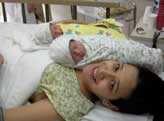 so we could go see her, and he concluded after doing some exams and x-rays, that after not having eaten she had dehydrated and had gases. They starting feeding her through an I.V. and she seemed to get better, later on, we were called again, she had not responded to the I.V. after all, and she was in a comma. A catheter was placed on her to try to stabilize her, but that was of no use, since she died around 12:00 midnight. Dr.. Coreas decided to also place Eva in an incubator, who even though was not yet presenting any symptoms, he did not want to discard the possibility that the same could happen to her. At 2:00 a.m. a test revealed acidity in the blood and he told us he was going to decrease it with baking soda; he then decided to do a blood test to check for ammonia, with the difficulty that at that time there was not a place that was open where the test could be done. He called us at 5:45 a.m. because he had found a lab that was open 24 hours. My husband took the sample, and when he returned, Eva had already died. Everything happened very quickly and according to what Dr. Coreas explained to us, everything pointed to a metabolic condition that did not allow for the assimilation of protein, which is consequence of my husband and I sharing the same gene that was passed on to our daughters. We finally had the result of the exam, Acidemia propiônico. Since then we’ve been reading and trying to understand how it is and what is, now we know a lot of it, we found the name amnio, but we are afraid of it, because we wouldn’t want to risk a new baby.
so we could go see her, and he concluded after doing some exams and x-rays, that after not having eaten she had dehydrated and had gases. They starting feeding her through an I.V. and she seemed to get better, later on, we were called again, she had not responded to the I.V. after all, and she was in a comma. A catheter was placed on her to try to stabilize her, but that was of no use, since she died around 12:00 midnight. Dr.. Coreas decided to also place Eva in an incubator, who even though was not yet presenting any symptoms, he did not want to discard the possibility that the same could happen to her. At 2:00 a.m. a test revealed acidity in the blood and he told us he was going to decrease it with baking soda; he then decided to do a blood test to check for ammonia, with the difficulty that at that time there was not a place that was open where the test could be done. He called us at 5:45 a.m. because he had found a lab that was open 24 hours. My husband took the sample, and when he returned, Eva had already died. Everything happened very quickly and according to what Dr. Coreas explained to us, everything pointed to a metabolic condition that did not allow for the assimilation of protein, which is consequence of my husband and I sharing the same gene that was passed on to our daughters. We finally had the result of the exam, Acidemia propiônico. Since then we’ve been reading and trying to understand how it is and what is, now we know a lot of it, we found the name amnio, but we are afraid of it, because we wouldn’t want to risk a new baby.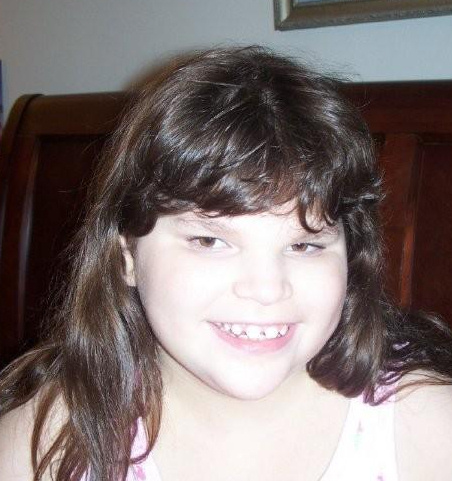 into the world on Sept. 28, 1999 our family rejoiced at your birth and I marveled at God’s newest creation. You were so big, 8lb. 14oz., and had a head full of beautiful dark hair! Dad and big brother Eric (2 1/2 years) helped take you home and we were satisfied our family was now complete. You were a good nurser, but on the third day at home you began to reflux after you ate. Our pediatrician reassured us it was just normal baby stuff, but something inside me felt wrong. Two months passed and although you were growing and developing the constant refluxing made things so difficult. Since I was nursing you I didn’t know how much you were really eating, and sometimes after you threw up you were just too tired to nurse any more. It seemed to me that you were reacting to everything I ate that was spicy, so I limited myself to a bland diet to try to help. It didn’t.
into the world on Sept. 28, 1999 our family rejoiced at your birth and I marveled at God’s newest creation. You were so big, 8lb. 14oz., and had a head full of beautiful dark hair! Dad and big brother Eric (2 1/2 years) helped take you home and we were satisfied our family was now complete. You were a good nurser, but on the third day at home you began to reflux after you ate. Our pediatrician reassured us it was just normal baby stuff, but something inside me felt wrong. Two months passed and although you were growing and developing the constant refluxing made things so difficult. Since I was nursing you I didn’t know how much you were really eating, and sometimes after you threw up you were just too tired to nurse any more. It seemed to me that you were reacting to everything I ate that was spicy, so I limited myself to a bland diet to try to help. It didn’t.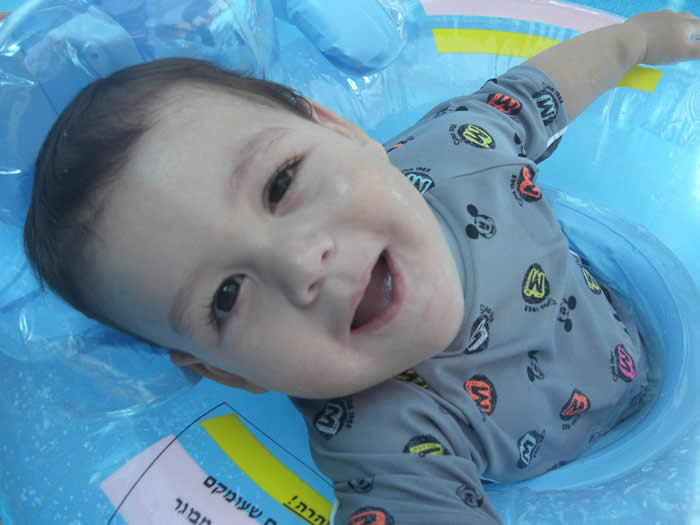 Nehori is now one year and ten month old, He was diagnosed as a PA suffer, a few hours after he was born. Ever since he was born he has been suffering from illnesses such as: lack of appetite, can’t eat appropriately through his mouth and being fed through narrow tube that is connected to his stomach.
Nehori is now one year and ten month old, He was diagnosed as a PA suffer, a few hours after he was born. Ever since he was born he has been suffering from illnesses such as: lack of appetite, can’t eat appropriately through his mouth and being fed through narrow tube that is connected to his stomach.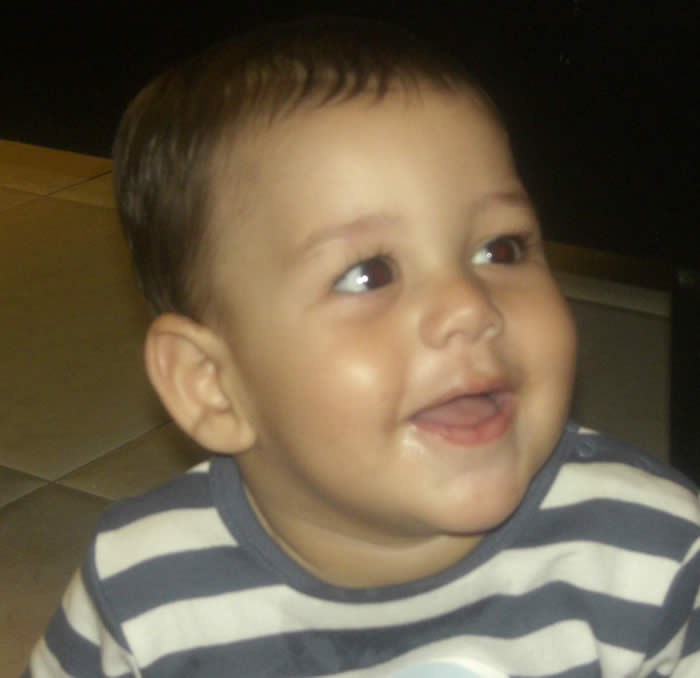 our doctor although the risks of the surgery this has changed his life. Neoray can now eat proteins without limitation. He started to walk and talk a little bit and start to have much less visits in the hospital as opposed to before. Now the ammonia doesn’t cause problems and the quality of his life has improved drastically.
our doctor although the risks of the surgery this has changed his life. Neoray can now eat proteins without limitation. He started to walk and talk a little bit and start to have much less visits in the hospital as opposed to before. Now the ammonia doesn’t cause problems and the quality of his life has improved drastically.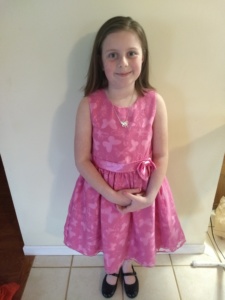
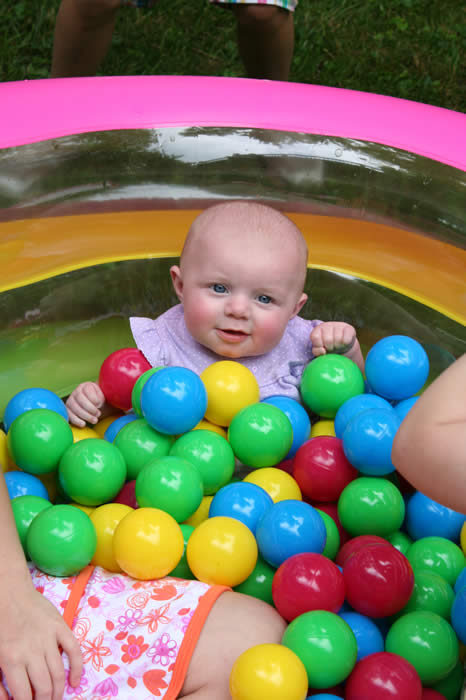
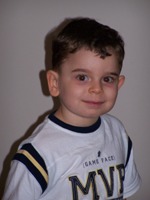 Born on April 21st of 2002, Trenton was born special. We knew that he was going to be special (and a little spoiled), ele foi o primeiro neto de ambos os lados de nossas famílias. Mal sabíamos o quão especial ele ia ser. After having a typical uneventful pregnancy, he was born a bigger boy than we expected. 8 lbs 7 ½ oz’s & 21 polegadas de comprimento. Nós o levamos para casa & started our new life together. For a few weeks, we thought we had the best baby ever. He slept soundly with us having to wake him up to eat & he never really got upset. Then the signs started… at about 3 weeks of age. He developed thrush in his mouth, had hiccups a lot & was constipated. The pediatrician assured us that all of this was normal. But on May 27th, we saw with our own eyes that something was not normal. Trent was lying on a blanket in the middle of our living room and starting having a seizure. It lasted only a few minutes then he was fine. Then a second seizure followed.
Born on April 21st of 2002, Trenton was born special. We knew that he was going to be special (and a little spoiled), ele foi o primeiro neto de ambos os lados de nossas famílias. Mal sabíamos o quão especial ele ia ser. After having a typical uneventful pregnancy, he was born a bigger boy than we expected. 8 lbs 7 ½ oz’s & 21 polegadas de comprimento. Nós o levamos para casa & started our new life together. For a few weeks, we thought we had the best baby ever. He slept soundly with us having to wake him up to eat & he never really got upset. Then the signs started… at about 3 weeks of age. He developed thrush in his mouth, had hiccups a lot & was constipated. The pediatrician assured us that all of this was normal. But on May 27th, we saw with our own eyes that something was not normal. Trent was lying on a blanket in the middle of our living room and starting having a seizure. It lasted only a few minutes then he was fine. Then a second seizure followed.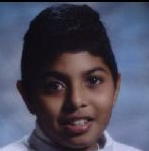
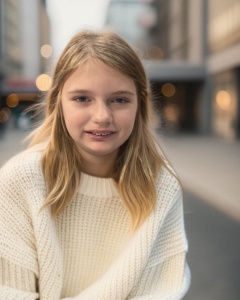
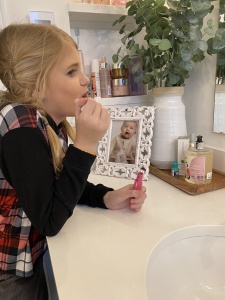
 like a long time for many, but we were around 15 years old at the time we met. Our lives were in perfect order; we completed college, secured great careers, married, and bought a beautiful home to grow our family. These were all things that we planned for before we decided to finally have children. We did not know at the time but God was preparing us for many upcoming challenges.
like a long time for many, but we were around 15 years old at the time we met. Our lives were in perfect order; we completed college, secured great careers, married, and bought a beautiful home to grow our family. These were all things that we planned for before we decided to finally have children. We did not know at the time but God was preparing us for many upcoming challenges.

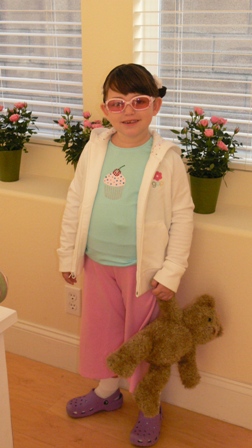 Kaitlin B.
Kaitlin B.
